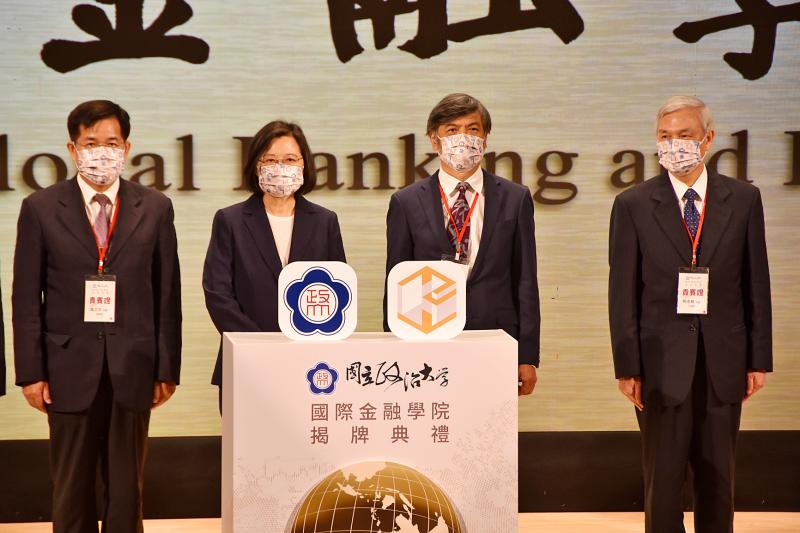President Tsai Ing-wen (蔡英文) yesterday encouraged the government, the private sector and academia to work together to develop and internationalize Taiwan’s financial sector by cultivating a local talent pool.
Speaking at a launch ceremony for National Chengchi University’s (NCCU) College of Global Banking and Finance, Tsai said that sound economic growth had enabled Taiwan to have good credit ratings and report solid foreign exchange reserves, creating a good foundation for the country to develop international finance at a time when the financial industry is becoming more global.
On April 29, S&P Global Ratings raised its long-term issuer credit rating for Taiwan from “AA” to “AA+,” saying that the outlook for the country’s economic performance was favorable based on robust demand for its electronics exports.

Photo: Wu Po-hsuan, Taipei Times
At the end of last month, Taiwan’s foreign exchange reserves fell by US$3.71 billion from a month earlier to US$545.06 billion, because of intervention by the central bank to prevent the New Taiwan dollar from losing value.
However, the country was ranked the fourth-largest forex reserve holder in the world, up one place from a month earlier.
In the post-COVID-19 era, Taiwan should cultivate a pool of banking talent to enable the local financial industry to speed up its efforts to meet international standards with assistance from NCCU’s College of Global Banking and Finance, Tsai said.
Taiwan should aim to become a finance hub for enterprises in Asia, as well as a center for wealth management for people with significant assets in the region, she said.
High-ranking government officials such as Minister of Finance Su Jain-rong (蘇建榮), central bank Governor Yang Chin-long (楊金龍) and Financial Supervisory Commission Vice Chairwoman Chiu Shu-chen (邱淑貞) also attended the NCCU ceremony, as did representatives from 27 financial institutions.
Tsai said that the presence of these attendees demonstrated Taiwan’s collective effort at becoming a regional financial hub, with the public and private sectors, and academia willing to pour resources into the college.
The new college is the second international finance department in Taiwan to be opened, the Presidential Office said in a statement.
The president last month attended the inauguration of the School of International Finance at National Sun Yat-sen University.
The NCCU college, which is bilingual, is to focus on four areas — international asset management; financial innovations; environment, social and governance; and inclusive financing and legal compliance — and is expected to create a new higher education teaching model by integrating theory with practice, Tsai said.
Inclusive financing is aimed at promoting the availability of banking services to the broadest segment of society at affordable terms.

PRAISE: Japanese visitor Takashi Kubota said the Taiwanese temple architecture images showcased in the AI Art Gallery were the most impressive displays he saw Taiwan does not have an official pavilion at the World Expo in Osaka, Japan, because of its diplomatic predicament, but the government-backed Tech World pavilion is drawing interest with its unique recreations of works by Taiwanese artists. The pavilion features an artificial intelligence (AI)-based art gallery showcasing works of famous Taiwanese artists from the Japanese colonial period using innovative technologies. Among its main simulated displays are Eastern gouache paintings by Chen Chin (陳進), Lin Yu-shan (林玉山) and Kuo Hsueh-hu (郭雪湖), who were the three young Taiwanese painters selected for the East Asian Painting exhibition in 1927. Gouache is a water-based

Taiwan would welcome the return of Honduras as a diplomatic ally if its next president decides to make such a move, Minister of Foreign Affairs Lin Chia-lung (林佳龍) said yesterday. “Of course, we would welcome Honduras if they want to restore diplomatic ties with Taiwan after their elections,” Lin said at a meeting of the legislature’s Foreign Affairs and National Defense Committee, when asked to comment on statements made by two of the three Honduran presidential candidates during the presidential campaign in the Central American country. Taiwan is paying close attention to the region as a whole in the wake of a

A magnitude 4.1 earthquake struck eastern Taiwan's Hualien County at 2:23pm today, according to the Central Weather Administration (CWA). The epicenter of the temblor was 5.4 kilometers northeast of Hualien County Hall, at a depth of 34.9 km, according to the CWA. The earthquake's intensity, which gauges the actual effect of a temblor, was the highest in Hualien County, where it measured 2 on Taiwan's 7-tier intensity scale. The quake also measured an intensity of 1 in Yilan county, Taichung, Nantou County, Changhua County and Yunlin County, the CWA said. There were no immediate reports of damage or injuries.

OFF-TARGET: More than 30,000 participants were expected to take part in the Games next month, but only 6,550 foreign and 19,400 Taiwanese athletes have registered Taipei city councilors yesterday blasted the organizers of next month’s World Masters Games over sudden timetable and venue changes, which they said have caused thousands of participants to back out of the international sporting event, among other organizational issues. They also cited visa delays and political interference by China as reasons many foreign athletes are requesting refunds for the event, to be held from May 17 to 30. Jointly organized by the Taipei and New Taipei City governments, the games have been rocked by numerous controversies since preparations began in 2020. Taipei City Councilor Lin Yen-feng (林延鳳) said yesterday that new measures by